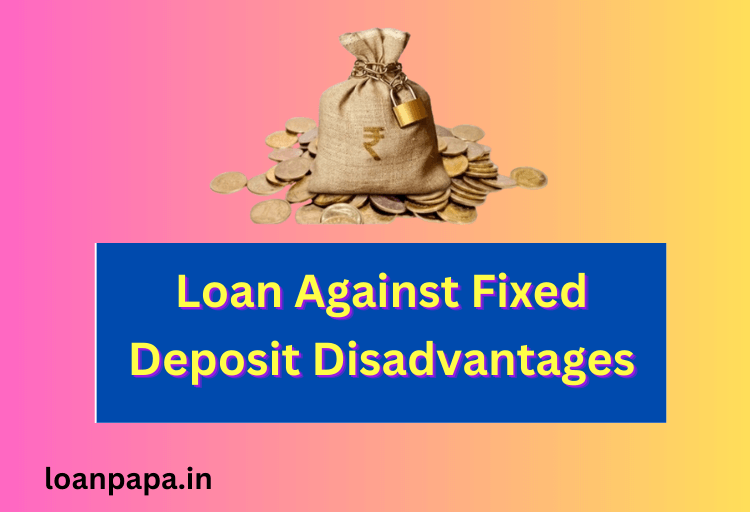
Contents
Loan Against Fixed Deposit Disadvantages
Loan Against Fixed Deposit Disadvantages: When it comes to managing financial needs, individuals often explore various options to fulfil their requirements. One such option is taking a loan against a fixed deposit. A fixed deposit is a popular investment instrument that offers stable returns and security. However, before considering a loan against a fixed deposit, it is important to understand the potential disadvantages associated with this financial arrangement. In this article, we will explore the disadvantages of taking a loan against a fixed deposit and discuss alternative options available.
What is a Loan Against Fixed Deposit?
A loan against a fixed deposit is a financial arrangement wherein an individual borrows funds from a financial institution using their fixed deposit as collateral. This allows individuals to access immediate funds while keeping their fixed deposit intact. However, it’s crucial to be aware of the drawbacks involved in this type of loan.
Disadvantages of Loan Against Fixed Deposit
1. Decreased Earning Potential
When a loan is taken against a fixed deposit, the interest earned on the deposit decreases. The interest earned on the fixed deposit serves as a source of income, and by taking a loan against it, the individual compromises their earning potential. It is important to consider whether the need for immediate funds outweighs the potential loss of interest income.
2. Limited Loan Amount
The loan amount that can be availed against a fixed deposit is typically limited to a percentage of the deposit’s value. This means that individuals might not be able to access the full amount of their fixed deposit, which can be a drawback for those who require a larger loan.
3. Impact on Financial Goals
Taking a loan against a fixed deposit can impact an individual’s financial goals. If the funds from the fixed deposit were earmarked for a specific purpose, such as education expenses or a down payment for a house, diverting them for a loan may hinder progress towards achieving those goals.
4. Fixed Deposit Closure
In some cases, taking a loan against a fixed deposit requires closing the deposit prematurely. Premature closure of the fixed deposit can lead to penalties or reduced interest rates, thereby affecting the overall returns on the investment.
5. Risk of Default
When taking a loan against a fixed deposit, individuals should be cautious about their repayment capacity. Defaulting on loan repayments can result in the financial institution liquidating the fixed deposit to recover the loan amount. This can lead to a loss of the original investment and potential financial difficulties.
6. Interest Rate Considerations
The interest rate charged on a loan against a fixed deposit may not always be the most competitive. Individuals should compare the interest rates offered by various financial institutions and evaluate whether the rate justifies borrowing against the fixed deposit or if alternative loan options provide better terms.
7. Impact on Credit Score
Defaulting on loan repayments can negatively impact an individual’s credit score. This can hinder their ability to access credit in the future and may have long-term consequences for their financial well-being. It is essential to consider the potential impact on creditworthiness before opting for a loan against a fixed deposit.
8. Alternative Options
While a loan against a fixed deposit may seem convenient, individuals should explore alternative options to meet their financial needs. Options like personal loans, overdraft facilities, or other credit instruments may offer more flexibility and better terms depending on the specific requirements.
FAQs on Loan Against Fixed Deposit Disadvantages
Is it good to take a loan against FD?
Taking a loan against an FD can be beneficial for immediate fund requirements, but it’s essential to weigh the disadvantages such as decreased earning potential and impact on financial goals before making a decision.
Is it good to take overdraft against FD?
Taking an overdraft against an FD can be a good option as it provides flexibility in accessing funds while keeping the fixed deposit intact, but it’s important to consider the interest rates and terms offered by the financial institution.
How do I repay my loan against FD?
Loan against FD can be repaid through monthly installments or as a lump sum at the end of the loan tenure, depending on the terms agreed upon with the lender.
What gives better returns than FD?
Investment options such as equities and mutual funds have the potential to provide higher returns than fixed deposits.
Conclusion
While a loan against a fixed deposit can provide immediate funds, it is crucial to evaluate the disadvantages associated with this arrangement. From decreased earning potential to limited loan amounts and potential impacts on financial goals, borrowers must carefully consider the trade-offs involved. It is advisable to assess alternative options, compare interest rates, and analyze the potential consequences before making a decision.
Read also:
Navi Loan App Fake or Real? Unveiling the Truth
Education Loan for MBBS: Financing Your Medical Dreams
Instant Cash Loan in 5 Minutes
NBFC Personal Loan for Bad Credit: Accessing Financial Assistance with Ease
